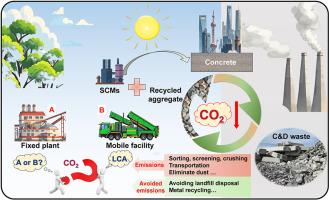A carbon footprint assessment for usage of recycled aggregate and supplementary cementitious materials for sustainable concrete: A life-cycle perspective in China
IF 9.7
1区 环境科学与生态学
Q1 ENGINEERING, ENVIRONMENTAL
引用次数: 0
Abstract
Recycled coarse aggregates (RCA) from construction and demolition (C&D) waste have emerged as a sustainable solution to the challenges of natural resource depletion and C&D waste disposal. However, amidst the global push to reduce carbon emissions, the embedded carbon in the recycling and transport processes of RCA has prompted questions about their effectiveness in mitigating concrete-related emissions. This study first compares the carbon footprint of RCA sourced from fixed and mobile plants with that of natural aggregates (NA). A two-stage transport model is incorporated to highlight the contrasting carbon emission characteristics of recycling RCA via these two modes in urbanized areas. Since supplementary cementitious materials (SCMs) are commonly used in concrete to improve performance and significantly reduce carbon emissions, the life cycle assessment (LCA) is further performed to explore the synergistic potential of combining RCA with SCMs for greater carbon mitigation. The results underscore the potential for reducing emissions from concrete by substituting NA with RCA recycled from both mobile and fixed plants. Sensitivity analysis further illustrates that the carbon reduction benefits of RCA can be enhanced by optimizing waste recycling programs. Considering both the technical characteristics and emissions of concrete, a combination of RCA and SCMs emerges as a more effective solution to mitigate emissions sustainably. It is anticipated that the results will provide valuable data and technical insights for policymakers.

可持续混凝土使用再生骨料和胶凝补充材料的碳足迹评估:中国的生命周期视角
从建筑和拆除(C&;D)废物中回收粗骨料(RCA)已成为应对自然资源枯竭和建筑和拆除废物处理挑战的可持续解决方案。然而,在全球推动减少碳排放的过程中,RCA回收和运输过程中的嵌入碳引发了人们对其在减少混凝土相关排放方面的有效性的质疑。本研究首先比较了来自固定和移动植物的RCA与天然骨料(NA)的碳足迹。采用两阶段运输模型,突出了两种运输方式在城市化地区循环RCA的碳排放特征对比。由于补充胶凝材料(SCMs)通常用于混凝土中,以提高性能并显著减少碳排放,因此进一步进行生命周期评估(LCA),以探索将RCA与SCMs相结合的协同潜力,以更大程度地减少碳排放。结果强调了用从移动和固定工厂回收的RCA取代NA来减少混凝土排放的潜力。敏感性分析进一步表明,通过优化废物回收方案可以提高RCA的碳减排效益。考虑到混凝土的技术特性和排放,RCA和SCMs的结合是一种更有效的解决方案,可以可持续地减少排放。预计研究结果将为政策制定者提供有价值的数据和技术见解。
本文章由计算机程序翻译,如有差异,请以英文原文为准。
求助全文
约1分钟内获得全文
求助全文
来源期刊

Journal of Cleaner Production
环境科学-工程:环境
CiteScore
20.40
自引率
9.00%
发文量
4720
审稿时长
111 days
期刊介绍:
The Journal of Cleaner Production is an international, transdisciplinary journal that addresses and discusses theoretical and practical Cleaner Production, Environmental, and Sustainability issues. It aims to help societies become more sustainable by focusing on the concept of 'Cleaner Production', which aims at preventing waste production and increasing efficiencies in energy, water, resources, and human capital use. The journal serves as a platform for corporations, governments, education institutions, regions, and societies to engage in discussions and research related to Cleaner Production, environmental, and sustainability practices.
 求助内容:
求助内容: 应助结果提醒方式:
应助结果提醒方式:


